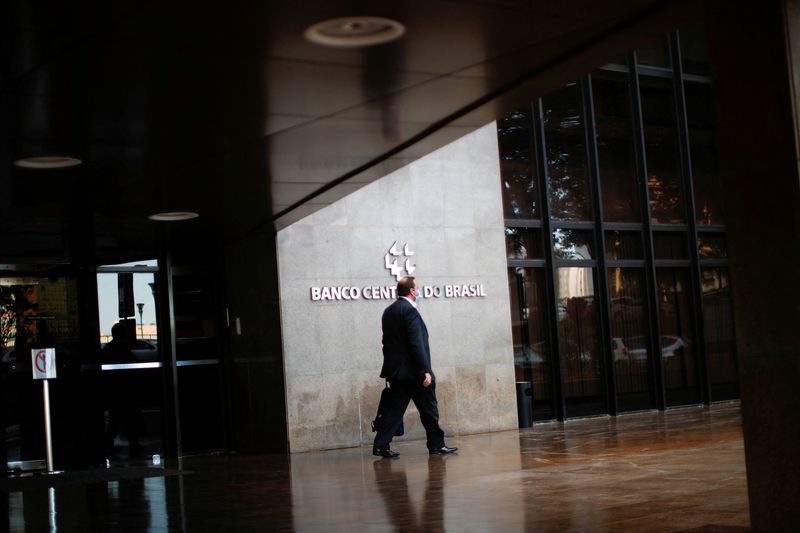Brazil central bank cuts rates by 50 bps, signals same beyond January
2023.12.13 19:14

© Reuters. FILE PHOTO: A man walks in front the Central Bank headquarters building in Brasilia, Brazil March 22, 2022. REUTERS/Adriano Machado/File Photo
By Marcela Ayres
BRASILIA (Reuters) -Brazil’s central bank lowered its benchmark interest rate by 50 basis points on Wednesday for the fourth time in a row and signaled that it would keep cutting rates at that pace beyond its next meeting in January.
Despite acknowledging cooling inflation and improvements in the global economy, the central bank held a steady outlook for its next steps, frustrating some economists who expected policymakers to open the door for bigger rate cuts.
The bank’s rate-setting committee, known as Copom, unanimously lowered the Selic policy rate to 11.75%, in line with the forecast of all 41 economists polled by Reuters.
The widely expected rate cut followed easing inflation, which the central bank recognized in its policy statement.
“Headline consumer inflation, as expected, remains on a path of disinflation, and various measures of underlying inflation are closer to the inflation target in recent releases,” wrote policymakers.
In the 12 months through November, inflation slowed to 4.68%, falling within the range of 1.75% to 4.75% targeted by the central bank for the year, but above the 3.25% center of the target.
Still, Copom’s statement signaled a steady pace for rate cuts ahead, adding that board members “unanimously anticipate further reductions of the same magnitude in the next meetings.”
“The statement was conservative considering the changes we’ve seen in the scenario from the last meeting until now. There could be room for a larger cut in the short term,” said Rafaela Vitoria, chief economist at Banco Inter, who forecasts 50 basis point reductions at each meeting until May.
Daniel Cunha, chief strategist at BGC Liquidez, maintained his forecast for rates to end the easing cycle at 9.75%, emphasizing that the statement shows a “prudent and conservative” central bank, “choosing not to incur the risk of attracting additional volatility.”
Central bank chief Roberto Campos Neto had previously indicated that policymakers saw no benefits in signaling future policy actions beyond their next meeting in January, for which they had already flagged another cut of 50 basis points.
In public remarks, he called for caution in analyzing variables such as perceptions of a more challenging global outlook and progress in Congress on measures to stabilize the country’s public finances.
President Luiz Inacio Lula da Silva’s government has stuck to a goal of erasing its primary deficit in next year’s budget bill, but several measures aimed at hitting that ambitious target still require approval from Congress.
Following the U.S. Federal Reserve’s decision on Wednesday to hold rates and signal lower borrowing costs next year, Copom said the global environment “remains volatile and is less adverse than in the previous meeting.”








